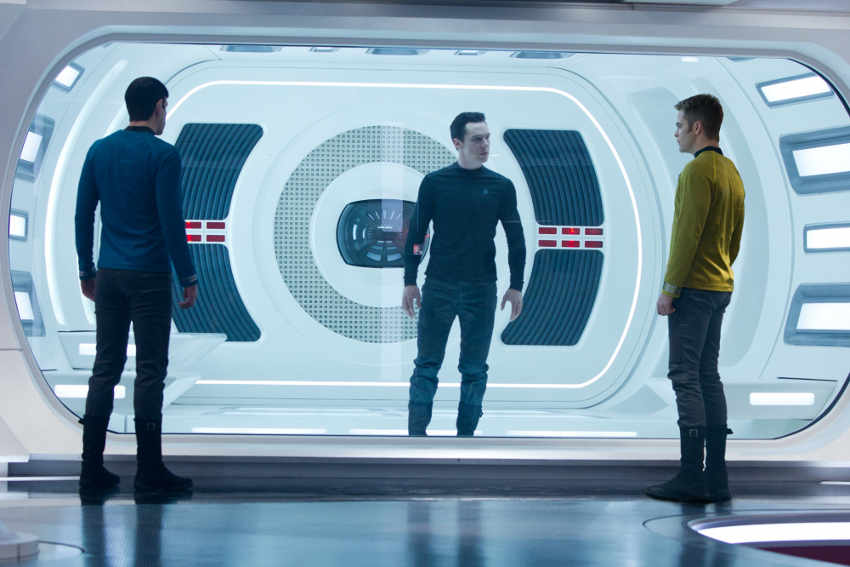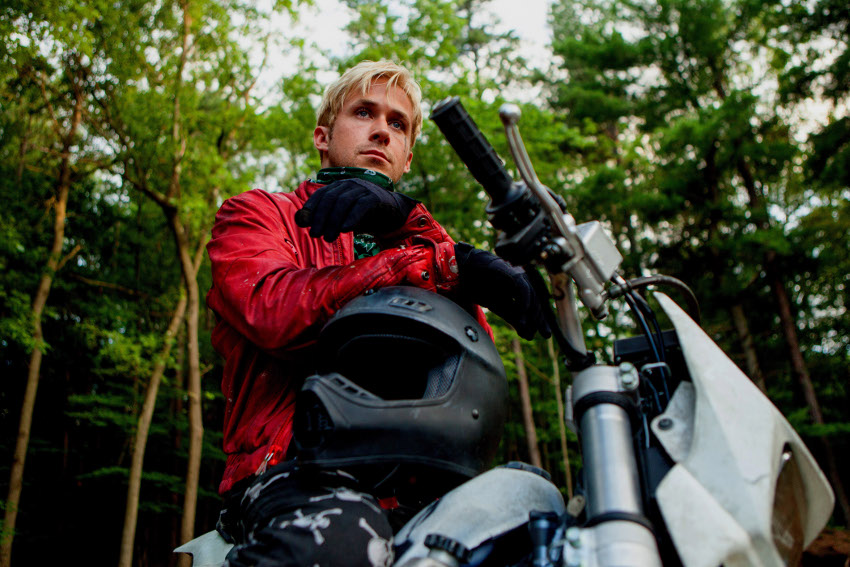Disclaimer: this list is alarmingly subjective and wildly personal; there are many films I didn’t see; and anything not released in the UK between 1.1.13 and 31.12.13 is ineligible (including 12 Years a Slave and American Hustle).
10. Alan Partridge: Alpha Papa (dir. Declan Lowney)
In Alan Partridge: Alpha Papa, Steve Coogan and Armando Iannucci achieved several elusive feats: they took a small-screen character to the big screen in a way that felt like it merited the cinematic treatment; they made Alan likeable enough to bring in a broad audience and a healthy box office; and they produced, unquestionably, the best opening credits sequence of the year, which I’ve YouTubed endlessly. There are loftier films higher up the list but with its quick-fire humour and superb leading man, Alpha Papa is possibly the best Norwich radio-set comedy of all time.
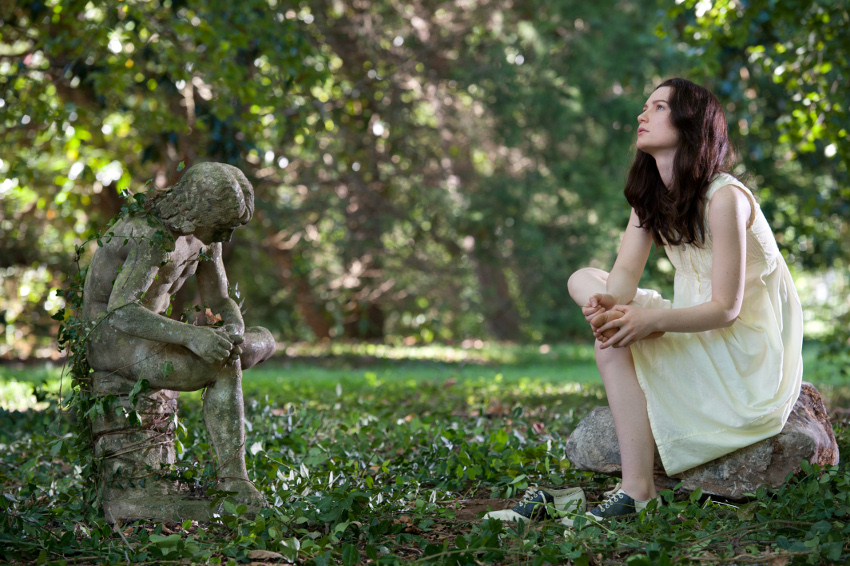
9. Stoker (dir. Park Chan-wook)
The director of mind-bending Korean classic Oldboy (2003) made his English-language début with this bizarre family drama, in which daughter Mia Wasikowska, mother Nicole Kidman, and mysterious uncle Matthew Goode deal with the death of loving father Dermot Mulroney. Goode’s uncle Charlie is an unearthly, impossibly handsome, undoubtedly dangerous sort and a tense love triangle starts to develop, every bit as weird as that in Park Chan-wook’s irresistible vampire tale Thirst (2009). It doesn’t have the visceral set pieces of Oldboy, so unwisely remade this year by Spike Lee, but the levels of visual sophistication and literary referencing make it a sumptuous watch.
8. Captain Phillips (dir. Paul Greengrass)
In recent years, the surfeit of poor Tom Hanks vehicles (Extremely Loud and Incredibly Close, Larry Crowne, Angels and Demons) has made many forget that he really is a very, very fine actor. In Paul Greengrass’ latest masterclass in cinematic tension, Hanks takes on the role of real-life hijacking victim Richard Phillips, captain of a container ship boarded by teenage Somali pirates in the Indian Ocean in 2009. The largely unknown cast of pirates is remarkable, but Hanks utterly inhabits Phillips, doing his best to keep his poker face in the face of mortal peril. It’s only in the last few scenes of the film where the gravity of Hanks’ performance is allowed to hit the viewer. It’s a mark of how strong the Best Actor category is at the 2014 Academy Awards that Hanks isn’t even nominated.
7. Star Trek Into Darkness (dir. JJ Abrams)
This was undoubtedly the most fun to be had at a cinema in 2013. JJ Abrams took the Lethal Weapon-in-space formula that worked so well last time, cranked up the lens flare, and dropped in Cumberbatch and Robocop. To the online Star Trek fan group that voted this the worst ever Trek film, Simon Pegg (Scotty) had this to say: “to be subject to that level of sort of, like, crass f**king ire, I just say, ‘F**k you’.” I’m inclined to agree – perhaps Trek used to be an incredibly serious and philosophical work of moral analysis, and perhaps certain elements veered too closely to cartoon territory (accents from Mr Pegg and Mr Yelchin as Scotty and Chekov, I’m looking at you). But who cares? It’s a gorgeous-looking fun-filled 3D romp in space, with Benedict Cumberbatch as a super-baddie squeezing people’s heads in. Sometimes that’s exactly what you want.
6. The Place Beyond the Pines (dir. Derek Cianfrance)
Derek Cianfrance renewed his collaboration with Ryan Gosling (after 2010’s Blue Valentine) for this cinematic elegy on fatherhood, told in three distinct acts, and with many of the hallmarks of a classic Greek tragedy. The cast is terrific, with Bradley Cooper, Ray Liotta, Eva Mendes and the delightfully grubby Ben Mendelsohn all shining in this tale of Gosling’s stunt bike rider embarking on a life of crime, with consequences that echo through the generations. It is slightly unfortunate that the last of the three chapters, told chronologically, is the weakest of the three; however it is an engaging watch from start to finish.
5. The Selfish Giant (dir. Clio Barnard)
This heartbreaking tale of truant children scrapping in Yorkshire is inspired by Oscar Wilde’s short story of the same name, although we’re a world apart from peach trees and spring-filled gardens here, with this being closer to the grit and grime of Andrea Arnold’s Fish Tank or even Paddy Considine’s Tyrannosaur. The two young leads – Connor Chapman as the scrappy, entrepreneurial Arbor, and Shaun Thomas as the gentle Swifty – are outstanding, with the sweetness and conflict between them painfully real, and Sean Gilder glowers as Kitten, the unscrupulous scrap merchant happy to exploit his young charges. For a low-key film there are moment of great tension, particularly the horse racing and the terribly dangerous thievery of scrap metal. The emotional pay-offs are huge and heavy, and the film reaffirms Barnard as a real talent, following her 2010 film The Arbor.
4. A Field in England (dir. Ben Wheatley)
Nobody does unease like Ben Wheatley. I still have nightmares about 2011’s Kill List. 2012’s Sightseers, a psychotic romantic road trip with Steve Oram and Alice Lowe, was about as mainstream as Wheatley was ever going to get, so it’s no surprise that he followed it up with something as marvellously off-piste and auteured as A Field in England, which could loosely be termed a ‘historical thriller’ but is really a lucid dream of men out of time, out of luck and out of their minds. During the English civil war, alchemist’s servant Whitehead (Reece Shearsmith) attempts to apprehend mysterious Irishman O’Neill (Michael Smiley), who quickly commandeers the group for his own nefarious, treasure-hunting ends. The preponderance of psilocybin mushrooms in the chosen field sees our merry band descend into maddening, transfixing scenes of dread and violence, including a terrifyingly intense mushroom trip. It’s not for everyone, but I can guarantee you’ve never seen anything quite liked it.
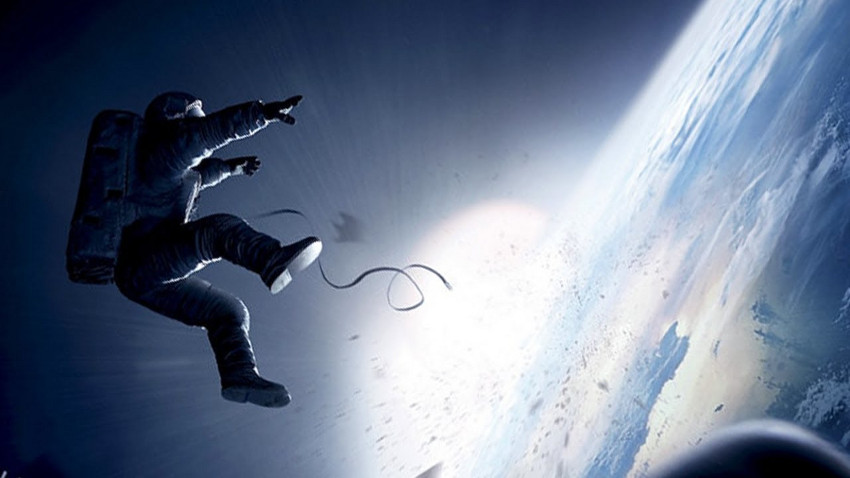
3. Gravity (dir. Alfonso Cuaron)
Every now and then a film has a scene so spectacular that it wrests me from the suspension of disbelief into utter real-world bewilderment, as I try to understand how the cinematic magicians put it on the screen in front of me. In The Secret in their Eyes (2009), the chase at the football match begins with a helicopter shot above the stadium, descending to focus on two detectives who spot their quarry and chase him down through the bowels of the stadium and out into the street, in one glorious unbroken take. I still have no idea how they did it. Gravity, with the exception of the final few moments, seemed to me to be entirely composed of such scenes. I have no idea how they did any of it. Its filming and execution are wonders that are frankly beyond me. Yes, the dialogue and plot are fairly schlocky, and yes, George Clooney’s character is just Coffee Ad George in a spacesuit, but the film remains a staggering technical achievement which has definitively raised the bar both for films set in space, and for the use of 3D. One of very few films that deserve, nay, demand, to be seen in wallet-worrying IMAX 3D.
2. The Great Beauty (dir. Paolo Sorrentino)
This tale of fading socialite Jep Gambardella, a one-book writer who settled into the dizzying Roman high life rather than work hard at that elusive second novel, is a wonderful experience from start to finish. It’s been described as both a satire of, and a love letter to, the cartoon excesses of the Berlusconi era. Although the film treads that fine line deftly, to summarise it as such would be to do it a disservice. Our creaking hero’s journey through his romantic misadventures and his professional and personal compromises leads us through a series of serenely beautiful set pieces: choral mysteries in the cloisters, midnight lovers’ walks through deserted squares, photo projects plastered over crumbling walls – all against the backdrop of the casual magnificence of the eternal city. The film is notable too for the best fight scene in 2013 – forget Superman v Zod or the thumping robots of Pacific Rim: Jep’s surgical verbal evisceration of the mendacious life of a fellow high-lifer is brutal to watch. Stay for the closing credits, which marry Martynov’s Beatidudes with a point-of-view cruise down the Tiber, and send you out of the cinema floating on air. If every film made its audience feel like this there’d be no war.
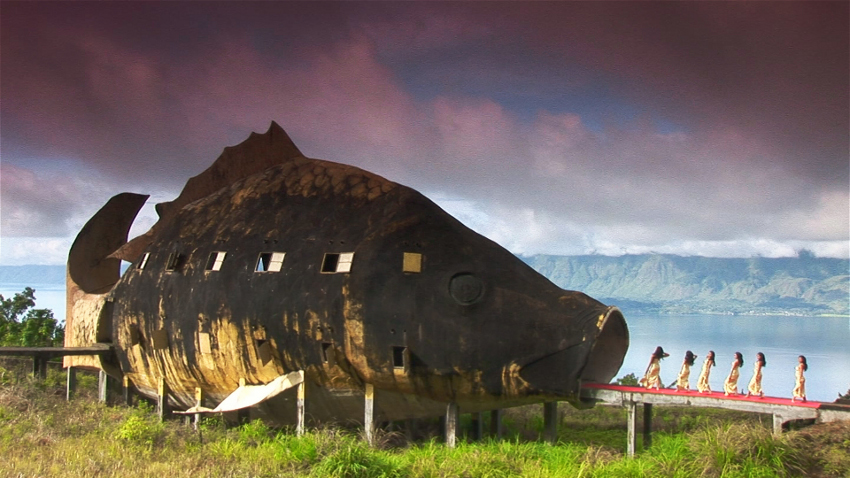
1. The Act of Killing (dir. Joshua Oppenheimer)
When Suharto seized power in Indonesia in 1967, he outsourced the wholesale slaughter of communists and suspected communists to paramilitary death squads. Far from facing justice and accountability, their patrons are still in power today, so these mass-murdering former gangsters are celebrated as folk heroes in much of Indonesian society.
How do you expose and explore such terrible deeds when there has been no admission of guilt, no possibility of prosecution, no remorse? If you’re documentarian Joshua Oppenheimer, the youngest filmmaker on this list, you give cameras to the perpetrators and ask them to tell their story, by making a film of their own.
The results are remarkable. The gangsters make movies in the style of those films which inspired their killing techniques in the first place – westerns and mob dramas. They are also fond of musicals, which leads to surreal scenes of soft-focus sing-alongs portraying genocide, of war criminals sitting around in full drag between takes. The principal subject, Anwar, explains to us how he changed his rooftop killing technique because he would get too much blood on his trousers. “How many did you kill this way?” “… Maybe a thousand?” In one incredible scene, they re-enact their sacking and burning of a village, replete with terrified child actors and screaming hysteria. Then someone yells cut and tries to explain to the children that everything will be ok.
Since watching The Act of Killing I’ve found it very difficult to describe the film in a way which makes people want to see it. It’s profoundly disturbing, genuinely upsetting, and nothing has ever made me feel the way I did during and after watching it. Some of the subjects are irredeemable psychopaths who show no regret, continue to boast, and revel in their revered status in Indonesian society. But some of them, confronting their crimes for the first time, albeit on their own terms, begin to break down; it’s very difficult to watch such a thing and not empathise with them, and then you remember who they are and what they’ve done. Although it’s not a film I could imagine anyone ‘enjoying’, it is a staggering, unique piece of work and demands to be seen by the widest possible audience.

